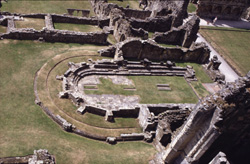 |
 |
 |
 |
 |
 |
 |
|
|
Aelred of Rievaulx (c. 1109-1167) like the sun at noonday he spread still more widely the clearness of his light.(1) Aelred was born at Hexham, Northumberland, and grew up at the court of King David of Scotland, where he later served as an administrator. On one occasion when Aelred was in Yorkshire on the business of the royal court he heard of the ‘angelic men’ of Rievaulx and, after visiting the community, decided to enter monastic life there. Aelred soon rose to prominence; he became novice-master of Rievaulx and was then sent to lead a new foundation at Revesby, Lincolnshire. In 1147 Aelred returned to Rievaulx and presided as abbot until his death in 1167. Aelred’s charisma and devotion encouraged many to join the community and the number of monks and lay-brothers rose considerably during his abbacy. He played a prominent role in affairs outside the Order, offering advice to rulers and religious communities, and arbitrating in disputes. Aelred’s writings were highly regarded by contemporaries and are still greatly valued. These include his treatises On Spiritual Friendship and The Mirror of Charity, his Rule for the Recluse, various sermons and a life of Edward the Confessor. Shortly after Aelred’s death in 1167 an account of his life was written by his pupil, Walter Daniel.(2) A contemporary, Jocelin of Furness, gives the following account of Aelred in his Life of St Waldef: He was a man of fine old English stock. He left school early and was brought up from boyhood in the court of King David with Henry, the king’s son, and Waldef. In the course of time he became a monk, afterwards abbot of Rievaulx. His school learning was slight, but as a result of careful discipline in the exercise of his acute natural powers, he was cultured above many who had been thoroughly trained in secular learning. He drilled himself in the study of the Holy Scripture and left a lasting memorial behind him in writings distinguished by their lucid style, and wealth of edifying instruction, for he was wholly inspired by a spirit of wisdom and understanding. Moreover, he was a man of the highest integrity, of great practical wisdom, witty and eloquent, a pleasant companion, generous and discreet. And, with all these qualities he exceeded all his fellow prelates of the Church in his patience and tenderness. He was full of sympathy for the infirmities, both physical and moral, of others. (3)
|
